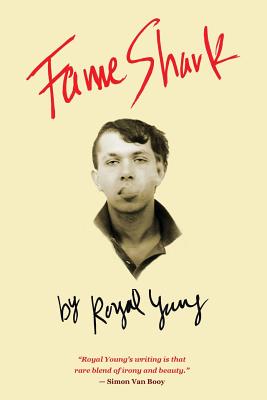
Fame Shark
by Royal Young
Heliotrope Books; 218 p.
How does one greet a memoir by someone in his 20s, detailing his lifelong, methodical quest for fame? Depending on your mood, I imagine, you’d either be charmed by it or secretly wish the author would seek psychiatric help. Happily, either reaction is appropriate while reading Fame Shark: Tales of a Lower East Side Hustler, Royal Young’s chronicle of his efforts as a child to become a child actor (resulting in extra parts in such movies as “Ransom” and “Bed of Roses”) and his later, booze-fueled immersion into Manhattan’s party and nightclub scene.
Fittingly, Young himself connects his own hunger for fame (“if my parents’ love,” he writes, “sometimes seemed conditional and twisted, then celebrity, where the whole great, grasping, unknowably vast world craved a piece of me, seemed like perfect compensation”) to mental illness. He recalls being a small boy and insisting that his psychologist mother administer psych tests to him. “My ambition was to have a big problem, like the children who stole her time as she tested them.” Disappointingly to Young, the tests don’t identify him as crazy. Meanwhile, his father, an artist who makes things like plates with penises on them, and who comes across as kind of crazy himself, has his own brush with fame, but merely a fleeting one. Young is crushed to have so briefly experienced the special treatment that the famous receive.
So, Young throws himself into childhood acting classes at Tada!, a youth theater program in Manhattan, filled with little kids trying to groom themselves for the spotlight. He assumes he’ll be singled out at the school, fast-tracked for superstardom. But the experience doesn’t go the way he wants. After his first public performance, his father criticizes him for nervously licking his lips while onstage. At an audition for Nickelodeon shortly afterwards, he begins stuttering and, humiliatingly, is passed over. He does get hooked up with a casting agent who gets him some work as an extra in movies, but that’s obviously not enough. He auditions for the LaGuardia High School of Music & Art and Performing Arts with some drawings of his and gets in. But he finds himself almost alienated to be surrounded by so many kids with similar desires to his own.
Fame Shark includes more standard coming-of-age material, as well. In a few dozen pages, Young gets Bar Mitzvahed, goes to a Goo Goo Dolls concert, and masturbates to a sex-ed book called, hilariously, What’s Happening To My Body? He dates a disturbed girl, grows even more distant and estranged from his parents (especially his father), and goes off to college. But from there out, Fame Shark takes a darker turn. Young experiments with drugs and alcohol, and is marked as a threat by campus security, who begin following him back to his dorm room from classes, shining flashlights at him. He forces a classmate to burn his arm with a cigarette. He experiments with homosexuality with a friend who has a crush on him. Dropping out of school, he falls in with a rich, drunken man named Evelyn, who takes him to debauched parties and practically forces himself upon him, handing him $50 afterwards. He falls to even further depths when he tries his hand at modeling. And then, the piece de resistance – he begins a sexual relationship with a 14-year-old girl named Winky. Nuts, right?
Laid out like that, the facts of Young’s life seem tawdry, like the life of someone Courtney Love might write a hit song about. Luckily, one thing that Young has is an abundance of charm. Throughout the book, you sense his good intentions even as he makes horrible errors in judgment. And his honesty in revealing some of the sketchier moments of his life is impressive. It isn’t every young heterosexual man who would feel comfortable portraying himself as deliberately encouraging the attentions of gay chickenhawks.
Young never gets famous in Fame Shark. The memoir ends in an unexpected place -– with Young and his father bonding over the death of Young’s grandfather. The book’s ending is hopeful, with father and son coming to a grudging understanding of each other. Hopeful, too, is the encouragement Young belatedly receives on his writing towards the end of the book. Perhaps the unspoken hope behind Fame Shark is that the book will become so popular that Young will become famous for having written it? I hope that happens. In this age of reality television celebrities, it is refreshing to come across someone like Young, someone who is unbelievably candid about not just his strengths, but his profound weaknesses, too. In doing so, Young achieves a real down-to-earthness that might probably elude the very celebrities he adores.
Follow Vol. 1 Brooklyn on Twitter, Facebook, Google +, our Tumblr, and sign up for our mailing list.
